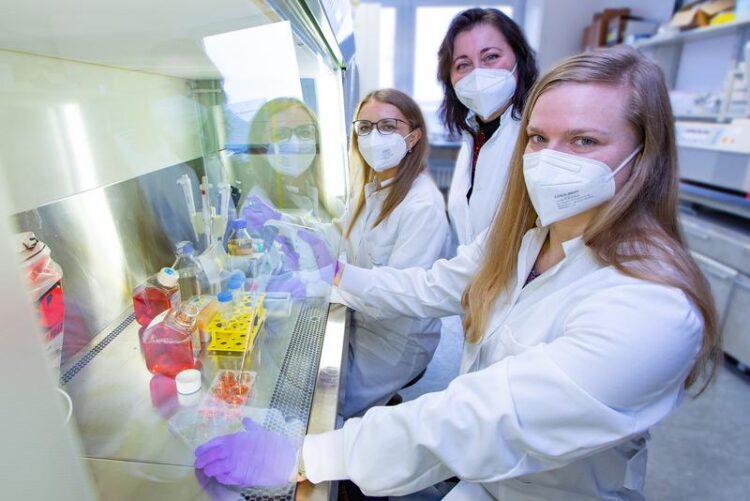Infectious agent offers protection against liver cancer

Inga Hochnadel (left), Dr. Tetyana Yevsa (centre), Dr. Lisa Hönicke (right) in the laboratory.
Copyright: Karin Kaiser/ MHH
Joint study by MHH and HZI: vaccine proves safe and effective against liver fibrosis and liver cancer.
Liver cancer is the third most common cause of cancer-related deaths worldwide. So far, the treatment options for two types of liver cancer, hepatocellular carcinoma (HCC) and cholangiocarcinoma (CCA), have been inadequate, while the number of new cases has been rising. A study by researchers at the Hannover Medical School (MHH) and the Helmholtz Centre for Infection Research (HZI) now offers hope. A vaccine based on a highly attenuated infectious agent called Listeria monocytogenes proved to be safe and effective protection in premalignant and malignant liver diseases in preclinical mouse models.
“Our Listeria-based vaccine delivers tumour-specific antigens while rapidly and efficiently activating an immune response that actively targets the liver tumour. As a result, the activated immune system keeps the growth of the liver tumour under control,” explains Dr Tetyana Yevsa, coordinator of the study and head of the research group in the Department of Gastroenterology, Hepatology and Endocrinology at MHH.
“In prophylactic vaccination of healthy mice in which liver cancer was later induced, survival increased to 100 per cent when vaccinated twice. The vaccine also proved safe in mice with liver fibrosis, which belong to the risk group for the development of liver cancer, and was also able to activate the immune system. This is particularly necessary to detect pre-malignant cells that can form into tumours and to eliminate them at an early stage,” says first author and doctoral student Inga Hochnadel, who conducts research in the MHH working group headed by Dr Tetyana Yevsa.
“In the case of an already existing tumour, the therapeutic use of the vaccine proved to be slightly more complicated,” adds co-first author Dr Lisa Hönicke, who conducted research under the direction of Dr Tetyana Yevsa. “When combined with antibody therapy, which is standard of care for liver cancer patients, the Listeria vaccine was shown to be more effective than antibody or Listeria therapy alone and prolonged the survival of mice even in advanced stages of the disease, giving us all great hope for such combination therapy in the clinic.”
“All-in-one”
For the researchers, the Listeria monocytogenes-based vaccine is an “all-in-one package”: “The Listeria-based vaccine activates the immune system but without causing infection and proves to be very safe. One advantage of this vaccine is that it can be adapted with little effort and a wide variety of tumour-specific antigens can be integrated,” says Professor Dr Dunja Bruder, head of the Immunoregulation research group at the HZI.
Mouse models reflect the human disease pattern
“Tumour development in the preclinical mouse models we have established is similar to that in humans,” says Dr Tetyana Yevsa. “Therefore, mouse data provide transferable insights to liver cancer patients, for example with regard to the efficacy of drugs. Consequently, the models have a high clinical relevance.”
The study results were published in the journal Oncogene. Several scientists from the MHH and the HZI as well as the Pathology Institute of the University Hospital Heidelberg cooperated for the study. The study was funded, among others, by the German Research Foundation, the Niedersächsische Krebsgesellschaft e.V. and the Gilead Sciences international research fellowship programme for liver diseases (research award for Dr Tetyana Yevsa).
SERVICE:
For further information, please contact Dr. rer. nat. Tetyana Yevsa, Yevsa.Tetyana@mh-hannover.de, phone (0511) 532-83164.
The original paper can be found here: https://www.nature.com/articles/s41388-022-02222-z#Sec18
Media Contact
All latest news from the category: Health and Medicine
This subject area encompasses research and studies in the field of human medicine.
Among the wide-ranging list of topics covered here are anesthesiology, anatomy, surgery, human genetics, hygiene and environmental medicine, internal medicine, neurology, pharmacology, physiology, urology and dental medicine.
Newest articles

First-of-its-kind study uses remote sensing to monitor plastic debris in rivers and lakes
Remote sensing creates a cost-effective solution to monitoring plastic pollution. A first-of-its-kind study from researchers at the University of Minnesota Twin Cities shows how remote sensing can help monitor and…

Laser-based artificial neuron mimics nerve cell functions at lightning speed
With a processing speed a billion times faster than nature, chip-based laser neuron could help advance AI tasks such as pattern recognition and sequence prediction. Researchers have developed a laser-based…

Optimising the processing of plastic waste
Just one look in the yellow bin reveals a colourful jumble of different types of plastic. However, the purer and more uniform plastic waste is, the easier it is to…



